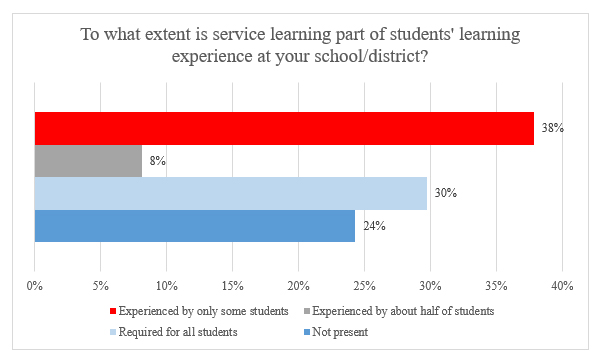Illinois Middle School Administrators Identify Opportunities for Course Integration
by Shawn P. Healy, PhD, Democracy Program Director
Legislation to require middle school civics (House Bill 2265) awaits consideration by Illinois Governor J.B. Pritzker, and the Illinois Civics team is hard at work designing a presumptive implementation plan. As I mentioned in the spring, we partnered with the Center for Information Research on Civic Learning and Engagement (CIRCLE) at Tufts University to determine the presumptive implementation needs of teachers, schools, and districts through a survey of middle school social studies teachers and administrators. This first post of a two-part series will dissect the findings from 45 administrators who completed the survey as of June 11.
As with the high school civics course requirement, Illinois middle schools would begin implementing a parallel requirement from a position of strength. A majority of those surveyed “strongly agree” that their school or district emphasizes civic knowledge (69%), participatory skills for active citizens (62%), commitments to upholding democratic ideals (59%), and intellectual skills for informed citizens (57%) for all students, regardless of their backgrounds or achievement levels.
On the other hand, service learning has been the greatest challenge with high school implementation, and less than one-third of middle school administrators report that it’s currently required for all students (30%; see graph below). However, administrators also identify service learning as a future priority as it develops student engagement and enthusiasm in the subject area and connects direct instruction and discussion with active citizenship.
While half of administrators “strongly agree” that civic learning is reflected in writing or reality in their school missions, a full quarter disagree and a fifth aren’t sure. These findings parallel those of a national Education Week survey of school administrators that I analyzed in April.
However, broad alignment of current and controversial issues discussions across academic disciplines (66% “agree”) and “strong encouragement” for teachers to discuss political issues in their classrooms (51% “agree”) provide solid grounding for a middle school civics course centered on discussion.
There was no consensus on the state of teacher professional development (PD) in civics (see graph below; the teachers have a decidedly different view on this subject, which we’ll take up in the next post). Acknowledging the challenge of adding a new course to an already-packed curriculum, many administrators see an opportunity for middle school civics implementation through PD, ongoing support, and “grade level appropriate materials,” a mix central to our three-year plan.






Comments
Post a Comment